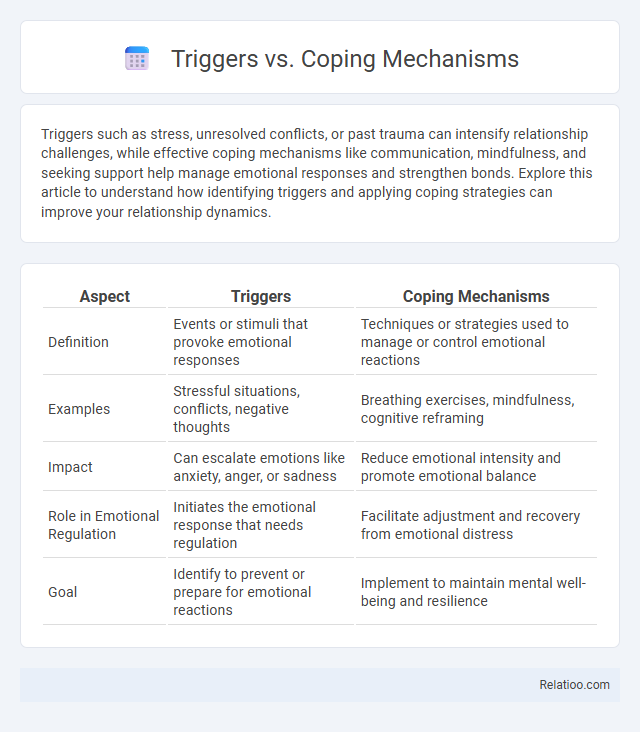Triggers such as stress, unresolved conflicts, or past trauma can intensify relationship challenges, while effective coping mechanisms like communication, mindfulness, and seeking support help manage emotional responses and strengthen bonds. Explore this article to understand how identifying triggers and applying coping strategies can improve your relationship dynamics.
Table of Comparison
| Aspect | Triggers | Coping Mechanisms |
|---|---|---|
| Definition | Events or stimuli that provoke emotional responses | Techniques or strategies used to manage or control emotional reactions |
| Examples | Stressful situations, conflicts, negative thoughts | Breathing exercises, mindfulness, cognitive reframing |
| Impact | Can escalate emotions like anxiety, anger, or sadness | Reduce emotional intensity and promote emotional balance |
| Role in Emotional Regulation | Initiates the emotional response that needs regulation | Facilitate adjustment and recovery from emotional distress |
| Goal | Identify to prevent or prepare for emotional reactions | Implement to maintain mental well-being and resilience |
Understanding Triggers: What They Are
Triggers are specific stimuli--such as sights, sounds, or situations--that evoke intense emotional or psychological reactions, often linked to past trauma or stress. They activate the brain's fight, flight, or freeze response, making individuals feel overwhelmed or distressed. Understanding triggers is essential for identifying patterns that provoke these reactions, which enables better management and prevention of adverse emotional episodes.
Types of Common Triggers
Common triggers include emotional stressors such as anxiety, specific memories, sensory stimuli like loud noises, and social situations that evoke discomfort or fear. You may encounter various types of triggers like situational, emotional, cognitive, or environmental, each prompting different responses. Understanding these triggers helps distinguish them from coping mechanisms, which are the strategies your mind and body use to manage and alleviate the impact of these triggers effectively.
The Science Behind Emotional Triggers
Emotional triggers activate the brain's amygdala, sparking immediate responses tied to past trauma or stress, while coping mechanisms involve prefrontal cortex engagement to manage or regulate these reactions. The neuroscience behind emotional triggers highlights how neural pathways reinforce automatic emotional responses, making awareness and adaptive coping strategies crucial for emotional regulation. Understanding your brain's response to triggers empowers you to develop effective coping mechanisms that reduce the intensity of emotional distress.
Identifying Your Personal Triggers
Identifying your personal triggers is crucial for managing emotional responses and preventing unhealthy coping mechanisms. Common triggers may include specific situations, people, or sensory inputs that provoke stress, anxiety, or negative emotions. By recognizing these triggers, you can develop targeted coping strategies that promote resilience and emotional well-being.
Coping Mechanisms: Definition and Importance
Coping mechanisms are the strategies and techniques individuals use to manage stress, emotional pain, or difficult situations, enabling better mental health and resilience. These mechanisms are essential for regulating your responses to triggers, which are specific stimuli that provoke emotional or psychological reactions. Understanding and developing effective coping mechanisms can help you maintain balance and improve your ability to handle life's challenges.
Healthy vs Unhealthy Coping Strategies
Triggers are external or internal stimuli that evoke emotional or behavioral responses, while coping mechanisms are the strategies you use to manage those reactions. Healthy coping strategies include mindfulness, exercise, and seeking social support, which promote resilience and emotional well-being. Unhealthy coping strategies, such as substance abuse, avoidance, or isolation, may provide temporary relief but often worsen stress and mental health over time.
How Triggers Activate Coping Mechanisms
Triggers are specific stimuli, such as situations, emotions, or sensory inputs, that activate stress or trauma responses in the brain. When a trigger is activated, coping mechanisms--both adaptive and maladaptive--engage to manage the emotional distress or discomfort caused by the trigger. These coping strategies may include behavior changes, cognitive reframing, or avoidance, aiming to reduce vulnerability and restore emotional balance.
Building Effective Coping Skills
Triggers are specific stimuli that provoke emotional or physical reactions, often linked to past experiences or trauma. Coping mechanisms are the strategies Your mind and body employ to manage stress or emotional distress triggered by these stimuli. Building effective coping skills involves identifying your unique triggers and developing healthy, adaptive responses to maintain emotional balance and resilience.
When Coping Mechanisms Fail
Triggers activate intense emotional responses linked to past trauma or stress, often overwhelming an individual's ability to process feelings. Coping mechanisms serve as strategies to manage these emotional surges, promoting stability and resilience during distressing moments. When coping mechanisms fail, individuals may experience heightened anxiety, impulsive behaviors, or emotional breakdowns, signaling the need for professional intervention or alternative therapeutic approaches to restore emotional balance.
Seeking Support: Therapy and Professional Help
Seeking support through therapy and professional help is essential for managing triggers that cause emotional distress and developing effective coping mechanisms. You can work with mental health professionals to identify underlying triggers, learn personalized coping strategies, and build resilience to prevent future episodes. Professional guidance enhances your ability to regulate emotions, improve mental well-being, and foster long-term healing.

Infographic: Triggers vs coping mechanisms
 relatioo.com
relatioo.com